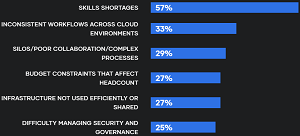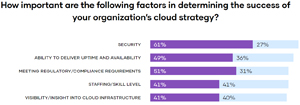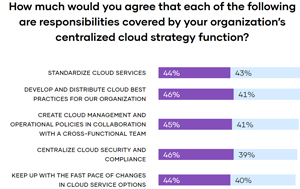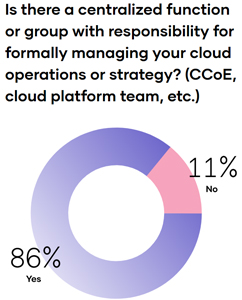News
Cloud Strategy Survey Highlights Skills Shortage, Cloud Overspend
It's generally a rosy picture for increasingly popular enterprise multi-cloud initiatives, but a skills shortage holds things back and cloud overspend is a significant problem, says a new survey-based report from HashiCorp.
The San Francisco-based specialist in infrastructure automation for multi-cloud environments this month published its second annual State of Cloud Strategy Survey, for which research firm Forrester Consulting in June conducted an online survey of 1,039 international application development and delivery professionals who work at companies of 1,000 or more employees across a broad range of industries.
Many results of the survey jive with last year's inaugural edition as reported in the Virtualization & Cloud Review article "Multi-Cloud Is New Normal, Survey Says, but Skills Shortage Persists," even though that report targeted more than 300,000 people in the opt-in contact database of HashiCorp, with no accompanying random survey.
For example, the persistent and pervasive talent dearth that was last year reported to be the top challenge hindering enterprises' ability to operationalize multi-cloud is still a problem.
"In our 2021 survey, skills issues were a critical inhibitor to respondents' cloud program," HashiCorp's report stated. "In 2022, skill shortages move to the top of the list. In addition, skills-related factors also featured prominently, with siloed teams, lack of training, manual operations and budget-constrained headcounts also complicating the ability to operationalize multi-cloud."
In its own take on the survey, Forrester provided some numbers: "Technology practitioners and decision-makers cite skills shortages (41 percent) as the number one factor impacting multi-cloud operations, followed by siloed teams (35 percent), lack of training (33 percent), and inconsistent workflows across cloud environments (30 percent). People and process issues like these are suppressing organizations' potential for efficient multi-cloud operations more than technology issues. Respondents say they plan to resolve these issues by standardizing and centralizing on a common operating model (59 percent), upskilling through certifications and education (53 percent), and forming closer partnerships with system integrator (SI) partners and consultants (49 percent)."
As shown in the following comparative graphics from the 2022 and 2021 reports, the skills shortage was also the top challenge last year, when it was listed by 57 percent of respondents, a difference of 16 percentage points.
 [Click on image for larger view.] 2022: Which of the following factors complicate your organization's ability to operationalize multi-cloud? (source: HashiCorp).
[Click on image for larger view.] 2022: Which of the following factors complicate your organization's ability to operationalize multi-cloud? (source: HashiCorp).
 [Click on image for larger view.] 2021: What are the most significant challenges hindering your ability to operationalize multi-cloud? (source: HashiCorp).
[Click on image for larger view.] 2021: What are the most significant challenges hindering your ability to operationalize multi-cloud? (source: HashiCorp).
Lack of needed skills was also a problem associated with another multi-cloud challenge in the 2022 report: avoidable cloud spend. Lack of needed skills was the No. 3 response to the question, "Which of the following factors contribute to avoidable cloud spend, also known as cloud waste, at your organization?"
 [Click on image for larger view.] Which of the following factors contribute to avoidable cloud spend, also known as cloud waste, at your organization? (source: HashiCorp).
[Click on image for larger view.] Which of the following factors contribute to avoidable cloud spend, also known as cloud waste, at your organization? (source: HashiCorp).
"Nearly all respondents said their organization has incurred avoidable cloud spend, and one in four organizations said they surpassed their annual projected cloud spend," HashiCorp said in a news release announcing the report. "Factors that contribute to avoidable cloud spend were idle or underused resources, overprovisioning of resources, lack of needed skills, or manual containerization. Just 6 percent of respondents said they do not have any avoidable cloud spend."
Noting that cloud overspending isn't just common but rather ubiquitous -- with more than 9 out of 10 of respondents reporting they wasted some of their cloud investment -- HashiCorp said organizations are addressing the problem with automated tools to enable central platform teams to leverage scarce cloud skills and enforce and manage a common cloud operating model.
"Fortunately, awareness of cloud waste is the first step to bringing it under control -- as noted above, 80 percent of respondents consider 'budget' an important or very important driver of cloud success," the study said. "Notably, many companies already seem to be planning for this and still staying on target for overall cloud spending: less than a quarter (24 percent) of respondents say they overspent their cloud budget in 2021 (only 5 percent underspent)."
HashiCorp said it wasn't surprising that the more budgeting and management responsibility respondents had, the more they saw cloud spending meeting expectations. For example, the company noted that 66 percent of respondents with titles of director and above said their budget was in line with expectations. Among respondents who have sole responsibility for cloud strategy, that number was 69 percent.
Beyond the ever-present skills shortage and the cloud overspending takeaways discussed above, other key findings and highlights of the new report include:
- 81 percent of respondents choose multi-cloud: 60 percent of respondents are already using multi-cloud infrastructures, with an additional 21 percent saying they will be within the next 12 months.
 [Click on image for larger view.] Which of the following describes your organization's multi-cloud strategy? (source: HashiCorp).
[Click on image for larger view.] Which of the following describes your organization's multi-cloud strategy? (source: HashiCorp).
- Operational complexity creates multiple challenges. Eighty-nine percent of respondents agree that security is the most critical determinant of success for a cloud strategy, and this is exacerbated by multi-cloud environment complexity. Thirty-one percent ranked complexity as the most significant internal challenge to cloud security.
 [Click on image for larger view.] How important are the following factors in determining the success of your organization's cloud strategy? (source: HashiCorp).
[Click on image for larger view.] How important are the following factors in determining the success of your organization's cloud strategy? (source: HashiCorp).
- 90 percent of respondents say multi-cloud is working: Out of those who have already adopted a multi-cloud approach, the vast majority say it is already helping their organization advance or achieve their business goals.
 [Click on image for larger view.] Has a strategy to use multiple clouds helped to advance or achieve your company's business goals? (source: Forrester).
[Click on image for larger view.] Has a strategy to use multiple clouds helped to advance or achieve your company's business goals? (source: Forrester).
- Centralized functions can tame multi-cloud operations, but platform teams are needed to execute them. Centralized cloud functions (e.g., cloud centers of excellence [CCoE], platform teams) are responsible for standardizing cloud services (87 percent), creating operational policies (86 percent), and centralizing security (85 percent). However, to mitigate people�and process-themed challenges like skills shortages (41 percent) and siloed teams (35 percent), organizations require platform teams with operational responsibility to implement these centralized functions.
 [Click on image for larger view.] How much would you agree that each of the following are responsibilities covered by your organization's centralized cloud strategy function? (source: HashiCorp).
[Click on image for larger view.] How much would you agree that each of the following are responsibilities covered by your organization's centralized cloud strategy function? (source: HashiCorp).
- 86 percent of respondents rely on cloud platform teams: Organizations have identified the need for a centralized group such as a cloud platform team or Cloud Center of Excellence (CCoE) to operationalize their cloud efforts with common practices across their organization.
 [Click on image for larger view.] Is there a centralized function or group with responsibility for formally managing your cloud operations or strategy? (CCoE, cloud platform team, etc.) (source: HashiCorp).
[Click on image for larger view.] Is there a centralized function or group with responsibility for formally managing your cloud operations or strategy? (CCoE, cloud platform team, etc.) (source: HashiCorp).
- Infrastructure automation tools are a catalyst for boosting operational efficiency. Eighty-nine percent of respondents agreed that automation is important -- 58 percent said extremely important -- to operationalizing multi-cloud infrastructure, and organizations are choosing to buy it instead of building it from scratch. Automation is helping to optimize cost and scale operations.
 [Click on image for larger view.] How important are automation tools for your organization to operationalize your multicloud infrastructure? (source: Forrester).
[Click on image for larger view.] How important are automation tools for your organization to operationalize your multicloud infrastructure? (source: Forrester).
Going forward, Forrester listed these recommendations:
- Tailor your multi-cloud strategy to your business goals. There are many flavors of multi-cloud, Forrester notes, and it's critical to determine which multi-cloud approaches you're targeting -- and why.
- Automate your way to reduce waste and increase efficiency. "Increasing cloud usage, along with an immediate ROI, should make the adoption of automated tools an easy and compelling choice," Forrester says. And "not just for reducing waste, but for increasing holistic efficiency."
- Leverage security automation tools to support multi-cloud operations. Forrester encourages firms to "leverage automation tools that not just save your operations teams time, but also solve complex IT problems, optimize cloud costs, and detect and remediate security vulnerabilities."
- Develop a platform team to cover all functional layers. Cloud platform teams help companies "operationalize and execute on security, governance and controls, policies and frameworks, internal trainings, cloud certifications, and more across the organization," Forrester says, noting that culture is just as important as training when it comes to building a successful platform team strategy.
In a blog post about the report, HashiCorp said in the coming weeks it will publish deep dives into the essential role of platform teams, security in a multi-cloud world, how to address skills shortages and more.